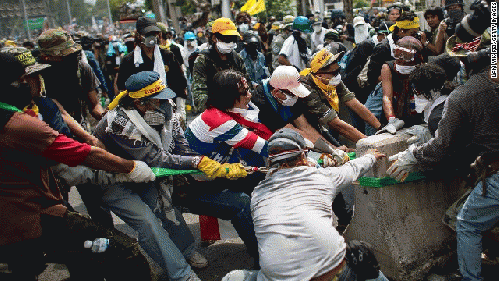This political thriller is actually developing, right now, in real time, in Thailand. The narrative should have a global audience at the edge of their seats; but the feeling is more one of perplexity because the plot is even more muddled than in the US cable TV sagas Homeland or Lost.
On November 11, Thai Democrat Party MP Suthep Thaugsuban, a former deputy prime minister, resigned to lead a popular revolt against the administration of Prime Minister Yingluck Shinawatra. This past Sunday night was showdown time. Suthep gave a two-day ultimatum for Yingluck to "return power" to "the people." The ultimatum expires later today. And it's non-negotiable. Yet Yingluck herself admitted, "We don't know how to make it happen. Right now we don't see any way to resolve the problem under the constitution."
Enter the Thai army. The Suthep-Yingluck showdown was brokered by army chief General Prayuth Chan-ocha. The heads of the navy and air force were also there. But then it was their turn to be perplexed as Suthep stuck to his "all or nothing" strategy. As it stands, only the Buddha knows what the army will do next; it has agreed only to meet later this week. Yingluck herself insists on its neutrality and commitment to "peace."
Nobody knows what "peace" means under the current volatility. It could mean the peaceful "Occupy" of Government House grounds in Bangkok this Tuesday, as the prime minister, only one day after a major street battle in the capital, left to the beach resort of Hua Hin, some 200 kilometers south and at present home to King Bhumibol Adulyadej, whose 86th birthday will be celebrated on Thursday. Or it could mean just a pause in the shadow-play before the battle restarts next week.
Pick your shirt
It's impossible to even begin to understand this Thai thriller without the context of an inexperienced prime minister totally out of her depth on every major dossier while the country is virtually run from a table at the Cafe Fauchon in Dubai by her exiled billionaire brother, Thaksin Shinawatra.
How the protesters have been organized and financed, and what array of interests they serve, remains an extremely murky story. Suthep himself -- from a family of wealthy landowners in the southern province of Surat Thani -- is part of the Thai elite. He's been an MP since 1979.
The fact that so far he has not been arrested -- although now there's a Criminal Court warrant on an "insurrection" charge, carrying the death penalty -- implies significant backing, especially from forces active in the 2006 military coup against then prime minister Thaksin.
Still, the facts on the ground point to Thaksinism -- or what the protesters define as the "Thaksin regime" -- only having itself to blame for the whole drama.
Thaksinism -- via Pheu Thai, its latest political party incarnation -- won the 2011 elections, securing over 48% of the popular vote. It's unclear how many of these were "reward" votes -- as in the trademark Thaksinism patronage of using the entire government network to reward an array of clients, plus its variations, from widespread cash vote-buying to more discreet tactics such as rice pledging. Thaksinism may afford money politics because the star of the show, after all, is a billionaire.
In spite of it all, there was some measure of stability in Thailand for the past two years. But then, about a month ago, the plot thickened -- via a monstrous miscalculation.
It started with a shady amnesty bill that would in the end have absolved Thaksin from convictions for corruption and abuse of power. The bill was easily approved by the Pheu Thai majority in the lower house but was finally killed in the Senate, when the Yingluck administration finally noticed how unpopular it was even with its own "red shirt" brigades; those actors the "red shirts" deem responsible for the violent repression against their street demonstrations in Bangkok in May 2010 would also be pardoned.
Thaksinism also pushed a constitutional amendment to change the Senate from half-appointed to fully elected. The Constitutional Court duly vetoed it. In Thailand, Constitutional Court judges swear an oath of allegiance to the King. Their key argument against a fully elected Senate is that it would become a replica of the free-for-all money politics of the lower house.
Predictably, the Pheu Thai Party refused to accept the Court's verdict; after all, this was the same court that had already dissolved Thaksinism's previous political parties.
The whole government-instigated drive to bring Thaksin home could not but be the certified issue capable of amassing a lot of angry people in the streets of Bangkok all over again. Suthep then formed and led the "People's Democratic Reform Committee," which evolved from anti-corruption street protests to the recent occupation of government ministries and state agencies.
Over a week ago, hundreds of thousands of people in this sort of Occupy Thailand movement were demonstrating peacefully in Bangkok by blowing their whistles. By then, though, the opposition Democrat Party was sniffing blood -- and the precious opportunity to turn an anti-corruption movement into a regime change operation.
So it's back, in a sense, to the same color-coordinated fissure that's been the story of Thai politics since the mid-2000s; "red shirts" versus "yellow shirts," now joined by the protesters "Thai shirts" (emphasizing the red, white and blue of the national flag).
(Note: You can view every article as one long page if you sign up as an Advocate Member, or higher).






